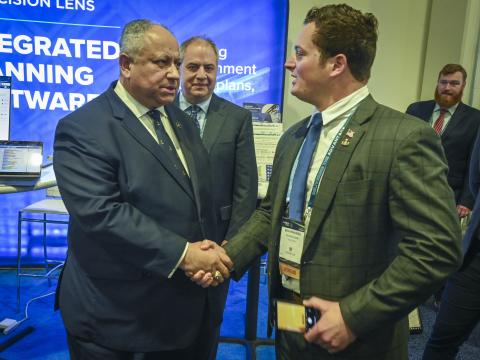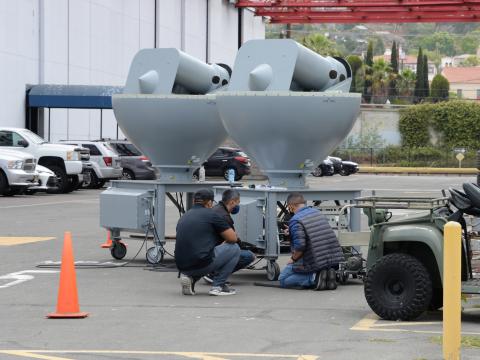After Active Duty: Making Connections
The After Active Duty blog series examines the challenges, rewards and lessons learned for those who have transitioned from active duty to the private sector and the role AFCEA played in this progression.
Former Navy lieutenant Ryan Cox is a non-techie who thrives in a technical world. His secret to success: connecting wherever he goes.
Cox served as a surface warfare officer for seven years and is now a senior business development executive with CACI International. CACI provides information solutions and services in support of national security missions and government transformation for intelligence, defense and federal civilian customers, according to the company website. Its solutions include but are not limited to business systems, command and control, communications, intelligence and surveillance and reconnaissance.
The company is organized by market segments, and Cox works within the business systems market. “Within that market, we have three submarkets: financial management systems, human resources systems and acquisition, supply chain and asset management. I am business development for all of that acquisition, asset and supply chain management market, so I have the Defense Department, intelligence community and federal civilian markets.”
So, while he is well-versed in technologies, and he works for a technology company, he doesn’t consider himself a technology expert. “I can’t go real deep into technologies. I can talk about them, and I’m constantly trying to learn and educate myself more, but I am not a super technical guy, no,” he offers.
Part of that education has included getting involved with AFCEA, a nonprofit association for professionals focused on cyber, command, control, communications, computers and intelligence. Unlike many AFCEA members who join the organization while still on active duty, Cox says that while in the service, he was unaware of the organization and the benefits it provides.
As a surface warfare officer, Cox served in a variety of non-technology related roles. He ran the engineering division and the deck division. He was the ship maintenance and materials officer and also served as a ship administrative officer and operations officer. None of those positions relate to AFCEA’s focus areas.
Still, he says, he would like to have joined the organization sooner. “Looking back, I wish I had known more about it because the military people who have been involved in AFCEA would have been a tremendous help,” he says, regarding his transition from active duty. “When I was getting out, I had no idea what I was doing. I had no network. I had nobody really to talk to. I was completely on my own, so I wish I had known about AFCEA when I was in.”
After separating from the Navy, Cox joined a small, commercial management consulting practice, where he helped launch and run the company’s federal business practice. It was there that a friend, who was serving as the president of the Young AFCEANs, told Cox about the association and urged him to get involved.
And he followed that advice with gusto. “That was when I really started to see the true value of AFCEA,” he says. Cox began volunteering with the organization and has led a number of committees and programs at the chapter and headquarters level. He followed in his friend’s footsteps and became president of the Young AFCEANs. He chaired the Small Business Committee and served as the nonprofit’s then-youngest board member. He also has served as the vice president of information, vice president of special activities and vice president and president of membership for the Northern Virginia Chapter.
Cox says his passion for AFCEA comes largely through helping others. “It has been great for me from a personal branding perspective, getting to know people, and I feel like I’m giving back, which is important to me, for the military in particular,” he says. “To me it has been well worth it, and I would definitely do it all again. If I can share that with people and help them get as much out of AFCEA as I did, then I’ll be happy.”
He credits the organization and its networking opportunities with helping him to land multiple jobs. Through the Young AFCEANs, for example, he met a recruiter for Gartner Inc., who encouraged him to apply for a position with the company. “I wasn’t even looking for a job, but he said they had an opening he thought I might be great for,” Cox explains.
He applied and interviewed but heard nothing. He later attended the AFCEA West conference, where he was being recognized with a Young AFCEAN award. Another awardee, an Air Force veteran, mentioned the opening at Gartner. When Cox explained that he had already applied and interviewed, the Air Force veteran introduced him the next day to the person actually hiring for the position.
“Because of those two relationships through AFCEA, they brought me back in again, and I was eventually hired for that position,” he reports.
Another friend and mentor Cox met through AFCEA encouraged him to apply at CACI and introduced him to others with the company. “Ultimately I was hired because of his introduction,” Cox says.
And, he reports, he couldn’t be happier. “One of the main reasons I joined the company is that they are so focused on the mission. They don’t just say it. It’s true in everything that we do. To me, that’s what makes it such a great company,” he adds.
While he may have honed his networking skills through AFCEA, Cox was successfully making connections before joining the organization. He grew up in Fairfax, Virginia, for instance, playing soccer. While he won’t come right out and say it, he apparently was pretty good. He connected with a coach for the Naval Academy, who recruited him to play for the school. “I wasn’t even really looking at the Navy until the coach came and said they really wanted me at the Naval Academy,” he notes.
Then, while stationed in California, his amateur league soccer coach suggested he apply for a new professional team, the Riverside County Elite.
“I laughed because I was in the Navy. I couldn’t play professional soccer. He told me to just try out and worry about it then. I tried out, and sure enough, I made the team,” he says, adding that he made it clear his Navy work schedule and deployments would get in the way.
The team no longer exists, and Cox adds that he barely earned the gas money for practice, but those connections helped him fulfill a dream of playing professionally—a dream he had given up when he signed up for the military. “It wasn’t anything really to brag about. It was two levels down from major league soccer, but I had a lot of fun doing it,” he says.
Another connection—his own brother, who is an executive chef—has helped Cox become a self-described foodie, which he defines as a bit of a food snob. “He makes awesome food, and he tells us the nice places to go. We try top-rated restaurants whenever we can,” he says.
The connections he made in the Navy are what he enjoyed most about serving, he indicates. “The camaraderie was unmatched. It’s something I certainly miss,” he says.
Join AFCEA now, one of the most cost-effective and efficient ways to help yourself and your career, while having fun and making a difference for many others across the globe.




